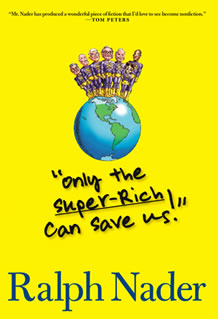 The world's pretty messed up right now. Everything's controlled by a few huge corporation who are to all intents and purposes above the law. Governments answer to the interests of big business. And big business answers to the interests of a few billionaires. The rest of us really don't matter a damn, and neither does the planet. Everything is sacrificed in the interests of profit.
The world's pretty messed up right now. Everything's controlled by a few huge corporation who are to all intents and purposes above the law. Governments answer to the interests of big business. And big business answers to the interests of a few billionaires. The rest of us really don't matter a damn, and neither does the planet. Everything is sacrificed in the interests of profit.So what can we do about it? Realistically, probably not a damn thing. We can elect different politicians, and within months, they'll be completely in thrall to the same old corporations. We can launch consumer protests and boycotts, but they have such a hold on every aspect of our way of life that it'll only work if we all go back to being self-sufficient pioneers, and that just ain't gonna happen.
In this book, Ralph Nader plays with an interesting idea. What if a bunch of super-rich people got together and decided to change things? Using the skills they've learned for manipulating governments, media, and economies, and their vast personal fortunes, they effectively launch a commercial revolution. They champion alternative energies, they challenge Wal-Mart's stranglehold over retail, they tackle healthcare billing fraud and insurance companies, and they fight the way that corporations buy politicians. As a Brit, I missed some of the political and commercial references, but enough came through to keep me hooked throughout. I also learned a lot from his use of real legal cases and legislation.
Nader's protagonists are all real billionaires or multi-millionaires; Warren Buffett, George Soros, Ross Perot, Ted Turner, Bill Cosby, Bill Gates Sr, Paul Newman, and Yoko Ono, for example. By contrast, most of their "opponents" are fictional: CEO Cumbersome, Edward Edifice, and so on. This gives the book a strange feeling. It keeps reminding you that Nader's talking about the real world, not some imaginary thriller conspiracy world, but at the same time, it's only fiction.
Now obviously, this is a satirical fantasy, and it's wildly utopian. Somehow, I don't think these guys are going to pledge their personal fortunes to save the world. However, it's an enjoyable book, and an easy read even though it's nearly 800 pages long. Nader's analysis of what's wrong with American society is insightful, and needs to be read.
For me, the best part was when he showed how overturning the corporations was not just within the spirit of the Constitution, but was also completely compatible with capitalism. Nader argues that what we have in the US isn't actually capitalism, it's state capitalism. The big corporations are backed by the state and supported by the state. The laws are written for their benefit. They pay lower taxes than smaller businesses or individual. They get huge handouts. They control the courts and the media. They get preferential treatment in every way. That's not free market competition. That's not capitalism. That's basically an economy based on state-sponsored monopolies - a classic hallmark of communist regimes.
Although I don't get to vote in this country*, I'm trying to get to grips with American politics. I'm rapidly coming to the conclusion that the whole Republican/Democrat thing doesn't matter. They may chant different slogans, but in the end, they don't run the country. The corporations do. Whoever gets to Washington, it's the corporate lobbyists and their vast budgets who decide how Congress votes. They're happy as things are and can effectively block any changes that don't benefit them. And you don't get to vote for them. Worse, they have huge support because of their total control over big media. "What's good for business is good for America," they say. "If you damage our business, it'll cost jobs," they threaten. "We bring you cheap goods - what's the problem?" they ask. And so people nod and turn a blind eye to all the corruption, profiteering, and monopolistic abuse of power.
If you want to see real change in America, what's needed is to get rid of the unelected cartel that controls the government, and Nader makes this point eloquently, passionately, and with conviction.
"I hope we shall crush in its birth the aristocracy of our monied corporations which dare already to challenge our government to a trial by strength, and bid defiance to the laws of our country."
Thomas Jefferson
*I can't vote because I'm a resident alien, not a US citizen. I could opt to become a US citizen in a couple of years, but I haven't decided whether that's something I want to do.


1 comment:
I'm currently reading David Harvey's A Brief History of Neoliberalism, and it's made it even clearer to me that in the US, the neoliberals and the neoconservatives bicker over some social issues while generally doing whatever corporations want. How we create a third alternative in a two-party state, I pray someone figures out soon.
Post a Comment